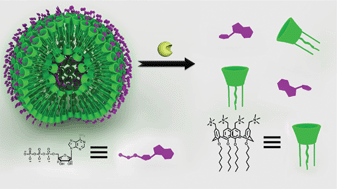Stimuli-responsive assemblies have generated a lot of interest in recent years especially in view of their biological applications. Enzyme-responsive assemblies for controlled drug release have gained particular interest as this offers potentially selective and targeted delivery of therapeutics.
A team of scientists from Nankai University (China) led by Yu Liu have fabricated a supramolecular assembly based on the host-guest complexation of amphiphillic calixarene with adenosine triphosphate (ATP). Complextion of the calixarene with ATP markedly lowers it’s critical aggregation concentration, forming hollow spherical nanoparticles. The nanospheres were shown to be responsive to phosphatase – an enzyme over-expressed in many tumor cells – and thus may have applications in drug delivery and cancer therapy.
Read the full article for free until the 24th May 2013:
Phosphatase-responsive amphiphilic calixarene assembly, Yi-Xuan Wang, Dong-Sheng Guo, Yu Caoa and Yu Liu, RSC Adv., 2013, DOI: 10.1039/C3RA40453F











